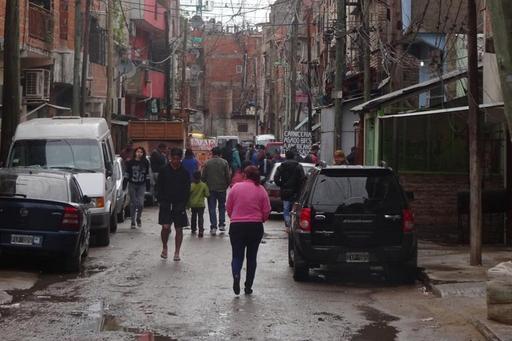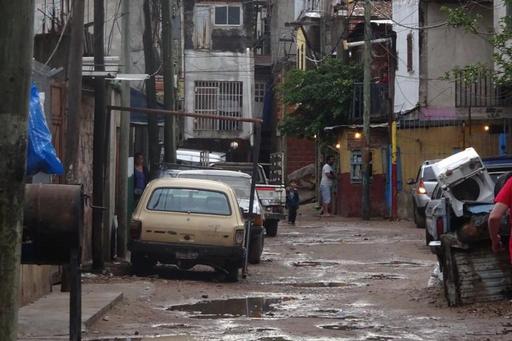
Compact cities and informal settlements. Exploring qualities, drivers and strategies for promoting sustainable urban development
Short description
Research and policy argue for more compact cities to respond to sustainable development challenges. However, there is little clarity on what actually needs to be made more compact. This is especially the case for informal settlements in in the global South, where generic, North notions of urban qualities, are even detrimental to positive urban change. This project contributes to a better understanding of the perceived qualities in compact cities as well as the strategies articulated by an array of actors in the informal urbanization processes. The focus of the project is on urban change in informal settlements in Kisumu (Kenya), but field studies in Buenos Aires, Cape Town and Havana facilitate comparative learning.
Both policymakers and researchers argue for compact cities as a response to social, ecological and economic challenges but it is unclear what qualities need to be more compact to achieve the purported benefits. This is especially the case for informal settlements in the Global South, where generic North notions of urban qualities are seen as standardized recipes to prompt development and fight poverty. Such recipes may be detrimental to an inclusive urban development since policies need to be contextualized to reflect how compactness possibly can improve residents’ liveability. Still, most research is limited to Global North cities neglecting that most of the urban expansion is taking place in highly dense informal settlements in developing countries.
This study contributes to bridge this gap and examines which urban compactness qualities and what strategies are needed to cope with informal urbanization and urban exclusion in the Global South.

METHODOLOGY
The project is informed by case studies in informal settlements in Havana (Dec 2016), Buenos Aires (Nov 2017, Mar and Oct 2018), Cape Town (Mar 2019) and Kisumu (Mar 2017, Apr 2018, Nov 2019). Data was gathered from document studies; more than hundred personal interviews with residents living in informal and highly-dense neighbourhoods, city officers, resident associations and other stakeholders; ethnographic and participatory observations in the four cities; focus groups; stakeholder workshops; and georeferenced surveys in Kisumu, Buenos Aires and Cape Town.
RESULTS
Qualities
Informed by a literature search, a taxonomy of compact city qualities was constructed. The literature study showed considerable weaknesses in compact city research in the Global South, especially linked to nature, health, environment issues, quality of life, sociocultural aspects, justice, economy, and urban adaptability and resilience.
Our field studies were therefore directed to bridge this gap. While confirming the existence of compact city qualities revealed by previous research, the georeferenced surveys highlighted the value of good neighbours as an important compact city quality, alongside being centrally located in the city and a vibrant and mixed local economy. Crowdedness, unemployment, criminality, violence, alcohol and drug abuse and deadly violence were the main negative aspects of living in dense informal neighbourhoods. Urban service provision including health and education, was another urban quality in need of significant improvement.
The study in Havana shows the importance of hidden but significant qualities, traditionally neglected in the literature. In the absence of public spaces, lack of employment and overcrowded houses, the streets, and their appropriation for social and economic activities, becomes a fundamental quality. By drawing from the human and social capital at hand, residents develop creative solutions to bridge the gap of infrastructures and services as a significant quality of compact neighbourhoods. The Havana study also shows how, in certain socio-cultural contexts, living in crowded spaces can be perceived as more social and convivial despite low living standards.
STRATEGIES
The georeferenced surveys identified the value of social, political and economic self-organizing as an important strategy in Buenos Aires, something largely missing in the other cities. Still, in Buenos Aires, strategies of self-help urbanism, street appropriation and economic entrepreneurship articulated by residents are often threatened by eviction or upgrading programs. After an initial land occupation, continued expansion and densification of the settlement was crucial to resist the government’s upgrading programs. Strategies of resistance were articulated around both dis- and re-connection: While disconnection facilitated self-construction, densification and the blooming of informal entrepreneurship; reconnection to local and global supportive networks (i.e. human rights movements, residents associations and networks, corporate social responsibility programs) enabled unexpected encounters with distant and powerful actors that helped to resist eviction. Finally, self-construction activities and the struggle to defend their rights have also developed local knowledge regarding construction and law. Learning linked to e.g. self-urbanism or entrepreneurship becomes a resilience strategy.
Elaborating on research results with stakeholders from informal settlements in Kenya
The project ended with workshops in two informal settlements in Kisumu, Kenya (Obunga and Nyalenda) In 2019, where research findings from the four cities were presented and discussed with a wide range of local stakeholders, a majority of which were community representatives. Although the contexts were very different, findings regarding urban qualities, drivers and strategies from Buenos Aires, Cape Town and Havana were of great interest for the Kisumu situation, and opened up new perspectives, although they need reinterpretation and translation to be operational for Kisumu. The study worked to build consensus among community members on critical areas and provide facts to support public participation and advocacy processes.

CONCLUSIONS
There is no universal compact city recipe to apply in policy and planning, as the effects are contextual.
Yet, there are some learnings for a more inclusive governance of compact informal settlements. First, to build compact and just cities, not ‘just’ compact cities, planning needs to include mobility for the urban poor; streets, alleyways and other urban public spaces that strengthen their role as important sociocultural and socioeconomic nuclei; and support of more diverse and mixed uses.
Second, people’s capacities and livelihoods need to be upgraded in parallel with the built environment. Once more equal opportunities for livelihoods are in place, the upgrading of physical urban qualities can be co-produced with residents through e.g. self-urbanism.
PUBLICATIONS
Articles
Kain, JH, Adelfio, M Oloko, M, Thuvander, L, Stenberg, J, Zapata, P, Zapata Campos, MJ 2020 What Makes a Compact City? Differences Between Urban Research in the Global North and the Global South, Scandinavian Journal of Public Administration, 24(4): 25 - 49
Zapata Campos, MJ, Kain, JH, Oloko, M, Stenberg, J, Zapata, P, Urban qualities and residents’ strategies in compact Global South cities. The case of Havana, Journal of Housing and the Built Environment (2021)
Zapata Campos, MJ, Kain, JH, Oloko, M, Scheinsohn, M, Stenberg, J, Zapata, P, Residents’ collective strategies of resistance in Global South cities’ informal settlements: space, scale, and knowledge. Cities. Forthcoming
Report
Zapata Campos, et al, 2019 Organizing grassroots initiatives for a more inclusive governance: constructing the city from below. ICLD Research report 15.
Conferences
Zapata, P, Kain, JH, Oloko, M., Scheinsohn, M, Stenberg, J, Zapata Campos, MJ 2018 Collective strategies of resistance in compact global South cities. Stories from the residents of the Villa Rodrigo Bueno. N-AERUS 19th
Kain, JH, Oloko, M, Stenberg, J, Zapata, P, Zapata Campos, MJ 2018 Citizen-driven strategies in global South cities’ informal settlements. Critical narratives from Buenos Aires, Havana and Kisumu. Devres Development Research Conference.
Zapata, P, Kain, JH, Oloko, M, Scheinsohn, M, Stenberg, J, Zapata Campos, MJ 2017 Urban informality and networks of livelihood and solidarity in compact cities. ISA RC21
Kain, JH, Adelfio, M, Oloko, M, Thuvander, L, Stenberg, J, Zapata, P, Zapata Campos, MJ 2016 Assumed qualities of compact cities: Divergences between the Global North and the Global South in the research discourse N-AERUS 17th